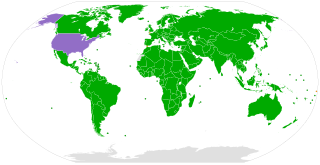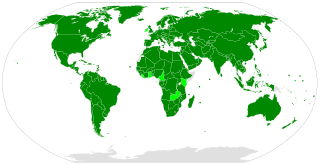Related Research Articles

Sudan's human rights record has been widely condemned. Some human rights organizations have documented a variety of abuses and atrocities carried out by the Sudanese government over the past several years under the rule of Omar al-Bashir. The 2009 Human Rights Report by the United States Department of State noted serious concerns over human rights violations by the government and militia groups. Capital punishment, including crucifixion, is used for many crimes. In September, 2019, the government of Sudan signed an agreement with the UN High Commissioner for Human Rights to open a UN Human Rights Office in Khartoum and field offices in Darfur, Blue Nile, Southern Kordofan and East Sudan. In July 2020, during the 2019–2021 Sudanese transition to democracy, Justice Minister Nasredeen Abdulbari stated that "all the laws violating the human rights in Sudan" were to be scrapped, and for this reason, Parliament passed a series of laws in early July 2020.

The United Nations Convention on the Rights of the Child is an international human rights treaty which sets out the civil, political, economic, social, health and cultural rights of children. The convention defines a child as any human being under the age of eighteen, unless the age of majority is attained earlier under national legislation.

Crimes against humanity are widespread or systemic criminal acts which are committed by or on behalf of a de facto authority, usually by or on behalf of a state, that grossly violate human rights. Unlike war crimes, crimes against humanity can be committed during both peace and war. They are not isolated or sporadic events because they are part of a government policy or they are part of a widespread practice of atrocities which is tolerated or condoned by a government or a de facto authority. They do not need to be part of an official policy, but they only need to be tolerated by authorities.

Children have been recruited for participation in military operations and campaigns throughout history and in many cultures.
Sexual violence is any harmful or unwanted sexual act or attempt to obtain a sexual act by violence or coercion, act to traffic a person, regardless of the relationship to the victim. This includes forced engagement in sexual acts, attempted or completed acts and occur without the consent of the victim. It occurs in times of peace and armed conflict situations, is widespread, and is considered to be one of the most traumatic, pervasive, and most common human rights violations.

The Special Rapporteur on the Sale and Sexual Exploitation of Children works on behalf of the United Nations Human Rights Council to investigate the exploitation of children around the world and make recommendations to governments on how to end such practices.

The Optional Protocol on the Sale of Children, Child Prostitution and Child Pornography is a protocol to the Convention on the Rights of the Child and requires parties to prohibit the sale of children, child prostitution and child pornography.

Human rights in the Middle East have been shaped by the legal and political development of international human rights law after the Second World War, and their application to the Middle East. The 2004 United Nations Arab Human Development Report (AHDR) claimed that although Arab-Islamic tradition does hold unique importance for ideas of human welfare, History has proven that "they were not sufficiently prevalent in society to foster a culture based on a political contract, and allow for the legitimacy of differences of opinion, dialogue and transfer of power." Issues of the validity of democracy in the region and human rights are at the very centre of the challenges facing Middle Eastern society today.

Human rights in Chad have been described as "poor"; for example, Freedom House has designated the country as "Not Free." Chad received a score of 7 for political rights and 6 for civil liberties.

In areas of the Democratic Republic of the Congo, the human rights record remained considerably poor, and serious abuses were committed. Unlawful killings, disappearances, torture, rape, and arbitrary arrest and detention by security forces increased during the year, and the transitional government took few actions to punish harsh people. Harsh and life-threatening conditions in prison and detention facilities; prolonged pretrial detention; lack of an independent and effective judiciary; and arbitrary interference with privacy, family, and home also remained serious problems. Security forces continued to recruit and retain child soldiers and to compel forced labour by adults and children.

Human rights in Rwanda have been violated on a grand scale. The greatest violation is the Rwandan genocide of Tutsi in 1994. The post-genocide government is also responsible for grave violations of human rights.

Human rights in Cameroon are addressed in the constitution. However, the 2009 Human Rights Report by the United States Department of State noted concerns in regard to election irregularities, security forces torture and arbitrary arrests.

United Nations Security Council resolution 1261, adopted unanimously on 25 August 1999, in the first resolution to address the topic, the Council condemned the targeting of children in armed conflict including the recruitment and use of child soldiers.
The Democratic Republic of the Congo (DRC) is a source and destination country for men, women, and children subjected to trafficking in persons, specifically conditions of forced labor and forced prostitution. The majority of this trafficking is internal, and much of it is perpetrated by armed groups and government forces outside government control within the DRC's unstable eastern provinces.

Human rights in South Sudan are a contentious issue, owing at least in part to the country's violent history.

Human rights violations during the Syrian civil war have been numerous and serious, with United Nations reports stating that the war has been "characterized by a complete lack of adherence to the norms of international law" by the warring parties who have "caused civilians immeasurable suffering". For a relatively small number of these war crimes, prosecution of Syrian civil war criminals has resulted.
Military use of schools is a term used to refer to the various activities that national armed forces and non-state armed groups carry out in and around schools, universities, and other education facilities, in support of their military effort. Examples of this include using a school or a university as barracks or bases, for offensive or defensive deployments, for storage of weapons or ammunition, for military training of soldiers, as observation posts, and as a detention facility.
The term international framework of sexual violence refers to the collection of international legal instruments – such as treaties, conventions, protocols, case law, declarations, resolutions and recommendations – developed in the 20th and 21st century to address the problem of sexual violence. The framework seeks to establish and recognise the right all human beings to not experience sexual violence, to prevent sexual violence from being committed wherever possible, to punish perpetrators of sexual violence, and to provide care for victims of sexual violence. The standards set by this framework are intended to be adopted and implemented by governments around the world in order to protect their citizens against sexual violence.

The Autonomous Administration of North and East Syria is a de facto autonomous region of Syria that emerged from 2012 onwards during the Syrian civil war and in particular the Rojava conflict. The current administration emphasises gender equality and pluralistic tolerance for religious and cultural diversity.

Portugal is generally considered as successful in upholding the civil liberties and protecting the human rights of its citizens. Portugal has proved to be determined in promoting and respecting human rights at an international and national level. The country's minister of Justice as of September 2018, Francisca Van Dunem, said that Portugal has had "a good track record" on human rights but violations still do persist.
References
- ↑ Human Rights Council:Report of the Special Rapporteur on the promotion and protection of human rights and fundamental freedoms while countering terrorism, 16/06/2015, pg 3
- ↑ "UNICEF - Convention on the Rights of the Child". 12 January 2015. Archived from the original on 12 January 2015. Retrieved 28 April 2017.
{{cite web}}: CS1 maint: bot: original URL status unknown (link) - ↑ Assembly, United Nations General. "A/RES/54/263 - Optional protocols to the Convention on the Rights of the Child on the involvement of children in armed conflict and on the sale of children, child prostitution and child pornography - UN Documents: Gathering a body of global agreements" . Retrieved 28 April 2017.
- ↑ Report of the Special Rapporteur on the promotion and protection of human rights and fundamental freedoms while countering terrorism, 2013, para.66
- ↑ Report of the Office of the United Nations High Commissioner for Human Rights on the human rights situation in Iraq in the light of abuses committed by the so-called Islamic State in Iraq and the Levant and associated groups
- ↑ "Geneva Conventions". Archived from the original on 12 March 2014. Retrieved 28 April 2017.
- ↑ President of the Security Council on the situation in Iraq , p. 2, and Security Council resolution 2170 (2014), para. 3
- ↑ Report of the independent international commission of inquiry on the Syrian Arab Republic , annex 2
- ↑ "Convention on the Rights of the Child" . Retrieved 28 April 2017.
- 1 2 United Nations Security Council: Report of the Secretary-General on children and armed conflict in Iraq, 2015, pg 6
- ↑ Committee on the Rights of the Child: Concluding observations on the combined second to fourth periodic reports of Iraq, pg 5
- ↑ Report of the Independent International Commission of Inquiry on the Syrian Arab Republic
- ↑ General Assembly Security Council: Children and armed Conflict, 69 session, 2015, p 32 Children and armed conflict
- ↑ Security Council: Report of the Secretary-General on children and armed conflict in Iraq, 2015, pg 9
- ↑ Townsend, Mark (5 March 2016). "How Islamic State is training child killers in doctrine of hate". The Guardian. Retrieved 22 January 2018.
- 1 2 Security Council: Report of the Secretary-General on children and armed conflict in Iraq, 2015, pg 11
- ↑ General Assembly Security Council: Children and armed conflict, 69 session, 2015, p. 33
- ↑ "Article 34, 37 and 39 of the Conventions on Rights of Children" (PDF). Retrieved 28 April 2017.
- ↑ "OPTIONAL PROTOCOL TO THE CONVENTION ON THE RIGHTS OF THE CHILD ON THE SALE OF CHILDREN, CHILD PROSTITUTION AND CHILD PORNOGRAPHY" (PDF). Retrieved 2022-11-18.
- ↑ Report of the Secretary-General to the Security Council, 2015 p. 19
- ↑ "Article 13- 17 of the Convention on the Rights of the Child" (PDF). Retrieved 28 April 2017.
- ↑ Report of the Independent International Commission of Inquiry on the Syrian Arab Republic, 2014, p. 10
- ↑ Report of the Independent International Commission of Inquiry on the Syrian Arab Republic, 2014, p. 11
- ↑ Report of the Independent International Commission of Inquiry on the Syrian Arab Republic, 2014, p. 13
- ↑ "Security Council Adopts Resolution 2170 (2014) Condemning Gross, Widespread Abuse of Human Rights by Extremist Groups in Iraq, Syria | UN Press". press.un.org. Retrieved 2022-11-21.
- ↑ Report of the Special Rapporteur on the promotion and protection of human rights and fundamental freedoms while countering terrorism, 2015, p. 11
- ↑ "Report on Human Rights in Iraq: January–June 2014" (PDF). Retrieved 28 April 2017.
- ↑ Report of the Independent International Commission of Inquiry on the Syrian Arab Republic, 2015
- ↑ Report of the Special Rapporteur on the promotion and protection of human rights and fundamental freedoms while countering terrorism, 2015, p.11
- ↑ "Article 12(3) Of the Rome Statue of the International Criminal Court" (PDF). Archived from the original (PDF) on 18 March 2018. Retrieved 28 April 2017.